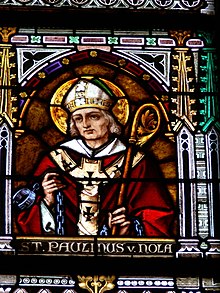Saint Paulinus of Nola | |
|---|---|
 | |
| Bishop and Confessor | |
| Born | 22 June 354 Burdigala, Gallia Aquitania, Roman Empire |
| Died | 22 June 431 (aged 76–77) Nola in Campania, the Praetorian prefecture of Italy, Western Roman Empire |
| Venerated in | |
| Feast |
|
Paulinus of Nola (/pɔːˈlaɪnəs/; Latin: Paulinus Nolanus; also anglicized as Pauline of Nola;[2] c. 354 – 22 June 431) born Pontius Meropius Anicius Paulinus,[3] was a Roman poet, writer, and senator who attained the ranks of suffect consul (c. 377) and governor of Campania (c. 380 – c. 381) but—following the assassination of the emperor Gratian and under the influence of his Hispanic wife Therasia of Nola—abandoned his career, was baptized as a Christian, and probably after Therasia's death became bishop of Nola in Campania. While there, he wrote poems in honor of his predecessor Saint Felix and corresponded with other Christian leaders throughout the empire. He is credited with the introduction of bells to Christian worship and helped resolve the disputed election of Pope Boniface I.
His renunciation of his wealth and station in favor of an ascetic and philanthropic life was held up as an example by many of his contemporaries—including Augustine, Jerome, Martin, and Ambrose—and he was subsequently venerated as a saint. His relics became a focus of pilgrimage, but were removed from Nola sometime between the 11th and 20th centuries. His feast day is observed on 22 June in both the Roman Catholic and Eastern Orthodox Churches. In Nola, the entire week around his feast day is celebrated as the Festival of the Lilies.
- ^ Schäfer, Joachim (25 May 2022). "Paulinus von Nola". Ökumenisches Heiligenlexikon (in Dutch).
- ^ Frank Leslie's Sunday Magazine. Frank Leslie. 1888.
- ^ Cite error: The named reference
Lofflerwas invoked but never defined (see the help page).